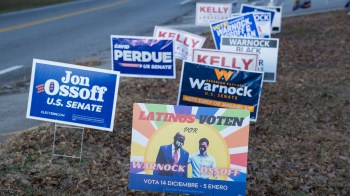Social Security, by the generations
Tess Vigeland: All the maneuvering in Washington over the debt ceiling appears to have killed the idea of a “grand bargain.” Legislation that could include reform of entitlements like Social Security and Medicare. Social Security’s reserves will dry up in 2036 if nothing is done to fix the program. It won’t be able to pay out more than it takes in in payroll taxes. That’s bad news for pretty much everybody — from people close to retirement all the way down to toddlers.
Marketplace’s Nancy Marshall Genzer decided to take a look at the issue through the prism of her own family.
Nancy Marshall Genzer: On a holiday, no one wants to talk about Social Security. But I did just that over the July Fourth weekend, wrenching my family away from talk of baseball and kids. There were a few wisecracks from my nephew, Ben, when I asked if he and his friends ever discussed retirement.
Ben Ellert: Honestly though, we usually sit around and watch a football game, and at commercials, we talk about Social Security.
Genzer: Smart aleck.
But eventually, I did get a sense of how each generation of my family has been or will be affected by Social Security. First, my grandmother. She was born in 1907. She was already an adult when Social Security was created. She didn’t start paying the payroll tax that funds Social Security until she was in her 30s. Yet she got a steady check in retirement. My parents paid more into the system. They’re getting that money back, and then some.
But my generation won’t be so lucky.
Beth Ellert: Well, I hope there’s some there, but I’m not planning on it being the backbone of my retirement.
That’s my sister, Beth. Our brother, Bill, has read a lot about what’ll happen to him after the Social Security trust fund runs out about a decade into his planned retirement. He thinks he’ll still be getting something from Social Security when he stops working.
Bill Marshall: Well I’m 53, and that would be 10 years to 15 years from now. I’m doing my best to save now so that we don’t have to count on Social Security. I think it’ll be around, but I don’t think the percentage is going to be there that’s supposedly there now.
My brother and I used to fight a lot, so I hate it when he’s right. If nothing is done to shore up the retirement system, his benefits will be cut by a quarter once the trust fund runs dry in 2036. The next generation will be hit even harder. My brother looks around at his kids, nephews and nieces as he muses about their role in the Social Security saga.
Marshall: And I think for those that might be in their twenties, I would expect it’ll continue to be a tax, but I wouldn’t plan on any sort of benefit — because you’re going to have to support us old people.
How frustrating. He’s right again. If nothing is done before 2036 and Congress doesn’t want to slash benefits, it’ll have to raise Social Security payroll taxes by a third instead. My nephew Ben is 23. He sums up the feelings of many twenty and thirty-somethings about contributing more to a retirement system they think is on shaky ground.
Ben: I don’t feel that Social Security benefits will be around to take advantage of when I’m retirement age.
Ben’s 18-year-old sister Leah learned about her status in the Social Security pecking order in high school, from a retiring American history teacher.
Leah Ellert: My teacher was a baby boomer and she was thanking us all for paying for her retirement. And it was a little depressing, a little shocking.
The news gets grimmer the younger you are. My poor little kids are really in trouble. I have two-year-old twin boys. In 2085, they’ll be 76. If nothing changes, Social Security won’t even be able to pony up three-quarters of promised payments. Benefits will have to be slashed again. My kids sum up their situation better than I can:
Marshall Genzer twins: Uh-oh.
It doesn’t have to be this way. Ronald Lee has made a career of studying families like mine. He’s a demographer and economist at Berkeley. Lee says we can make some gradual changes to Social Security now to replenish the trust fund.
Ronald Lee: It’s definitely true that if we act today, raising taxes and cutting benefits, then it’s going to be easier on future generations.
Lee says we could raise the retirement age to 69 or 70, and require the wealthiest Americans to pay Social Security taxes on more of their earnings. A bit of tough medicine now, to avoid howls of pain in the future.
Children screaming
In Washington, I’m Nancy Marshall Genzer for Marketplace Money.
Marshall Genzer twins: Bye, bye.
There’s a lot happening in the world. Through it all, Marketplace is here for you.
You rely on Marketplace to break down the world’s events and tell you how it affects you in a fact-based, approachable way. We rely on your financial support to keep making that possible.
Your donation today powers the independent journalism that you rely on. For just $5/month, you can help sustain Marketplace so we can keep reporting on the things that matter to you.


















